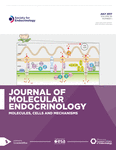SGK1 inhibitor reverses hyperglycemia partly through decreasing glucose absorption
- Department of Endocrinology, Drum Tower Hospital Affiliated to Nanjing University Medical School, Nanjing, People’s Republic of China
- Correspondence should be addressed to D-L Zhu; Email: zhudalong{at}nju.edu.cn
Abstract
This study investigates the effectiveness and mechanisms of a serum- and glucocorticoid-inducible kinase 1 (SGK1) inhibitor in counteracting hyperglycemia. In an in vivo experiment, we demonstrated that after an 8-week treatment with an SGK1 inhibitor, the fasting blood glucose and HbA1c level significantly decreased in db/db mice. RT-PCR and western blot analyses revealed that intestinal SGK1 and sodium glucose co-transporter 1 (SGLT1) expression were enhanced in db/db mice. Treatment with an SGK1 inhibitor decreased excessive SGLT1 expression in the intestine of db/db mice. In vitro experiments with intestinal IEC-6 cells showed that the co-administration of an SGK1 inhibitor partly reversed the SGLT1 expression and glucose absorption that were induced by dexamethasone. In conclusion, this study revealed that the favorable effect of an SGK1 inhibitor on hyperglycemia is partly due to decreased glucose absorption through SGLT1 in the small intestine. These data collectively suggest that SGK1 may be a potent target for the treatment of diabetes and other metabolic disorders.
- serum- and glucocorticoid-inducible kinase 1 (SGK1)
- small intestine
- IEC-6 intestinal cells
- sodium glucose co-transporter 1 (SGLT1)
- Received 15 February 2016
- Accepted 23 February 2016
- Made available online as an Accepted Preprint 1 May 2016
- © 2016 Society for Endocrinology











